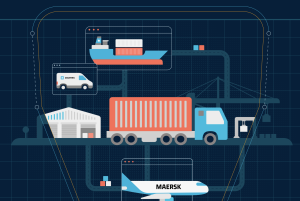 Head of Supply Chain at Kimberly-Clark in Nigeria, Adenike Onasoga, chats to SmartProcurement about the significant gap that exists between the surging market for supply chain solutions and the inadequate number of professionals in the industry who can provide the necessary leadership and innovation.
Head of Supply Chain at Kimberly-Clark in Nigeria, Adenike Onasoga, chats to SmartProcurement about the significant gap that exists between the surging market for supply chain solutions and the inadequate number of professionals in the industry who can provide the necessary leadership and innovation.
In recent weeks, I have immersed myself in events centered around investments in the African startup scene and discussions on fostering a sustainable ecosystem for these businesses. Platforms like Faith Institute’s Annual Policy Dialogue and Endeavour’s Catalyzing Conversation Conference, highlighted crucial aspects such as policy, governance, investments and the pivotal roles of supply chain and technology in the growth of African startups.
In all of these discussions, one thing that jumped out at me is the opportunity for more supply chain professionals to lead and be at the forefront of innovation. Notably, the market for supply chain solutions has surged by almost 40% since 2020, with projections indicating further growth. However, these conversations and innovations are often led by individuals from non-supply chain backgrounds, revealing a significant gap.
Market Dynamic and Gap
Supply chain professionals are renowned for their technical prowess and high-performance capabilities in managing successful supply chains and ensuring resilience in the value chain. However, it is time to introspect and ask whether we possess the entrepreneurial mindsets and innovative skills needed to be the catalysts for change and disruption.
Current Trends
Many supply chain professionals are upskilling with non supply chain skills like coding, which is commendable. However, it is crucial to assess whether these educational pursuits, including the myriad of supply chain degrees and certifications available today, are nurturing innovation.
There is a perception that supply chain is not synonymous with innovation which needs to change, especially given the thriving market for supply chain solutions, which was estimated at $35 billion in 2022 and projected to reach $42 billion in 2023.
Size of the Gap
Venture capital investments in supply chain tech startups have witnessed substantial growth, rising from $28 billion in 2021 to an estimated $32 billion in 2022. Yet, the question remains: why are supply chain professionals not proportionately represented in these discussions and actively driving innovation?
A study by MIT-Stanford Venture Lab reveals that supply chain professionals are less likely than their counterparts in other industries to be involved in innovation initiatives. Gartner emphasizes the high demand for supply chain professionals with innovation skills, with 90% of C-level executives recognizing the critical nature of innovation. Paradoxically, only 30% of supply chain professionals feel equipped with the skills and knowledge to drive innovation.
Justification
While the surge in the supply chain startup market is driven by increased complexities, the rise of e-commerce, changing consumer behaviors, and a growing emphasis on sustainability and the green economy, a notable gap exists. To bridge this gap, supply chain professionals must actively contribute to the innovation landscape. The importance goes beyond market potential or investment figures— it is about ensuring that solutions developed are not just disruptions but genuine answers to everyday needs.
Encouraging supply chain professionals to actively shape the narrative and contribute to the innovation landscape is paramount. It is not merely about catching up with market trends but actively participating in shaping a future where supply chain solutions are not just disruptions but essential contributors to growth, efficiency, and unparalleled innovation.
There is a call for supply chain entrepreneurs, consultants, and professionals to step up and bring their expertise to the forefront. This is not just about business and organizations; it is about making a tangible impact on real people. As we look to contribute to the innovation space,let us ensure that supply chain professionals are not only at the back-end but actively shaping the future at the front, making a significant impact on the African startup scene and beyond
Navigating Challenges in Supply Chain Innovation
As an individual supply chain professional, embracing the call to take a leading role in innovation is a journey fraught with challenges. Recognizing and addressing these challenges head-on becomes paramount for personal growth and contributing meaningfully to the transformative landscape of supply chain innovation.
Individual Challenges:
- Traditional Mindsets: One of the prevailing challenges encountered on a personal level is the persistence of traditional mindsets within the supply chain domain. The industry’s historical association with stability and risk aversion can be a personal hurdle, requiring a mindset shift to embrace the inherent uncertainty that accompanies innovation.
- Resource Constraints: Operating within environments where resources are constrained, both in terms of time and budget, presents a personal challenge. These constraints may limit personal experimentation and the adoption of innovative practices, thus necessitating creative solutions within personal capacities.
- Lack of Skill Alignment:
Despite the growing trend of upskilling among supply chain professionals, aligning acquired skills seamlessly with the demands of innovation remains a personal challenge. Ensuring that personal skills are in sync with the evolving needs of the industry becomes crucial to overcome individual hurdles. - Strategies for Overcoming Challenges:
Cultivating an entrepreneurial mindset and fostering a mindset that encourages experimentation and values calculated risk-taking is vital. Taking personal initiatives to embrace an entrepreneurial spirit and recognizing and rewarding personal innovative efforts can contribute to cultivating a culture of innovation. - Investment in Continuous Learning and Cross Skilling:
Addressing the challenge of skill misalignment requires a personal commitment to continuous learning. Proactively seeking out training programs, online courses, and potential collaborations with educational institutions can ensure that personal skills are consistently updated and aligned with the latest trends in innovation. - Collaboration and Skill Diversification:
Breaking down personal silos and actively seeking collaboration with professionals from other domains becomes instrumental. Forming cross-functional partnerships brings diverse perspectives and skill-sets to the table, fostering a more holistic approach to personal problem-solving.



























